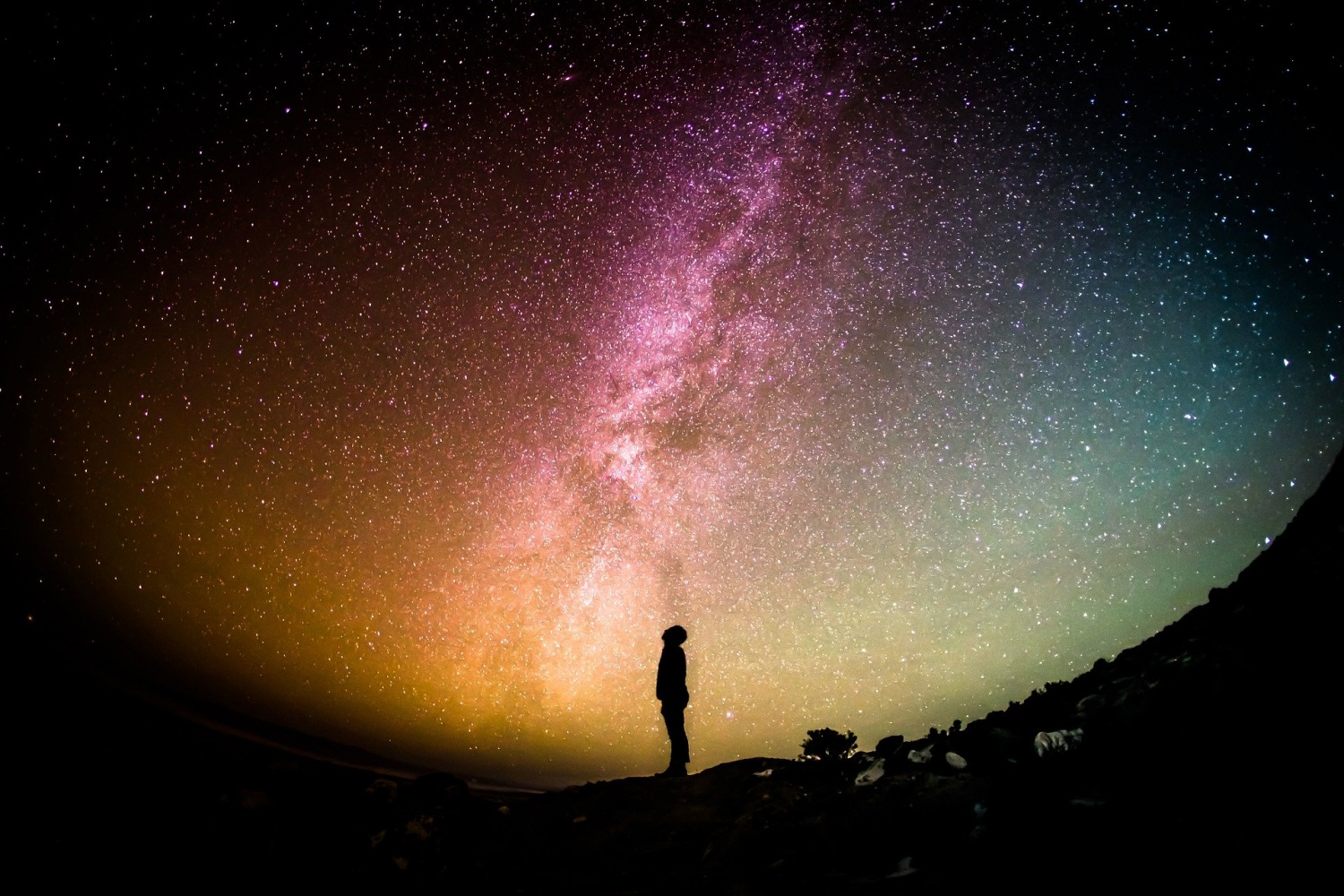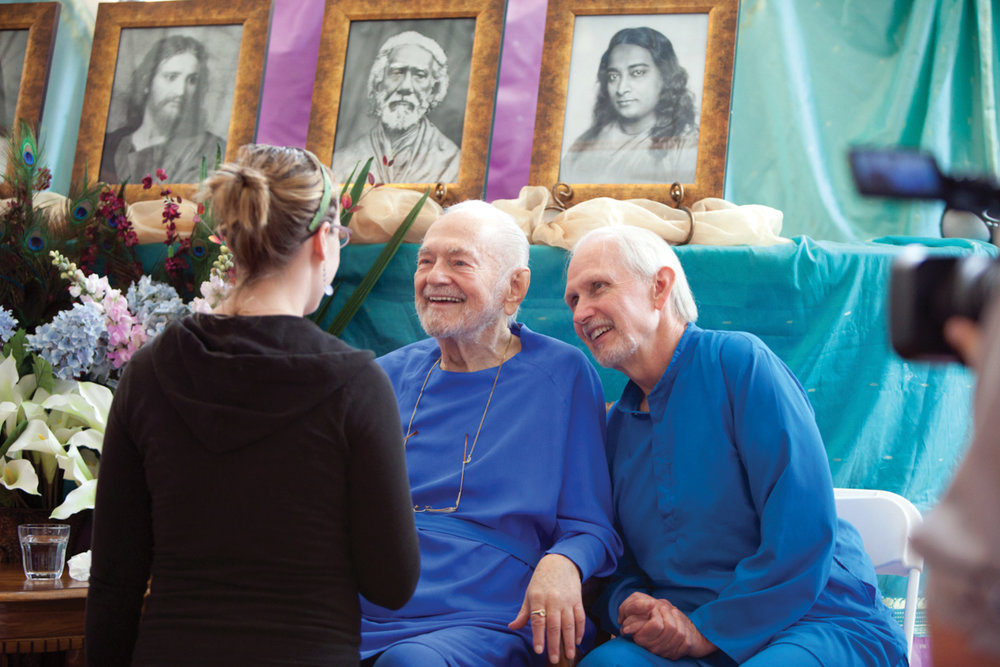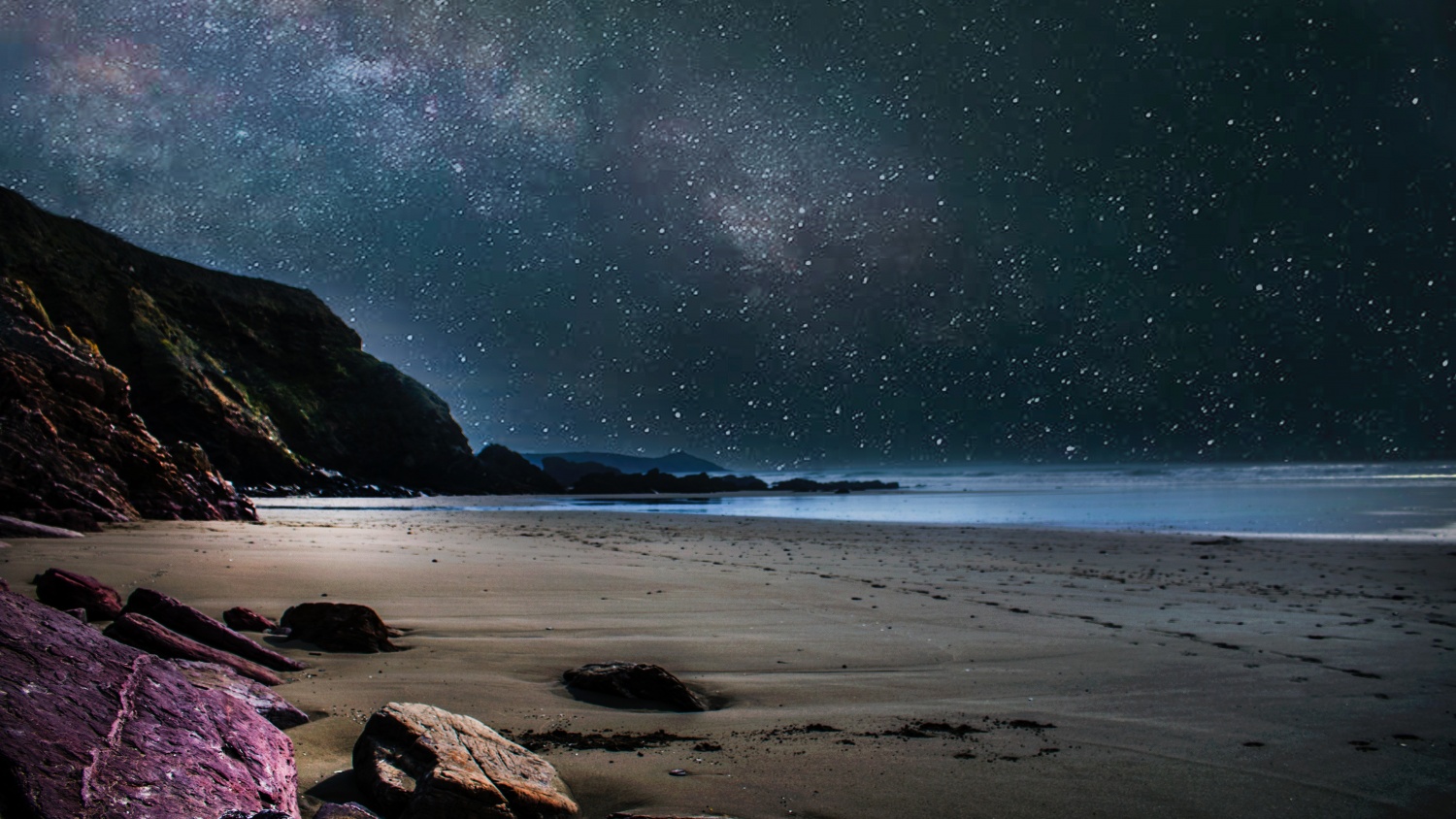To find God, it will help us to try to see, feel, and think of everything differently from what we are accustomed to doing. That is why, among devotees in India, much is made of the importance of bhav, right spiritual attitude. We must try constantly to rise above seeing everything in reference to our egos, and stop thinking, “My home, my wife or husband, my children, my clothes, my job, my friends, my position in the world, my reputation, my talents, my strengths, my defects, my advantages, my disadvantages.” You can see that the list might be endless. Everything that most people see, even impersonally, they tend to relate back to themselves. Even when they step out under the heavens at night and contemplate that infinite vastness, with its myriad stars and its inconceivable reaches of space, their usual reaction is to think, “How small I feel myself, by comparison!”

An artist sees a beautiful sunset and thinks, “I wonder if I could paint as beautifully?” Someone else contemplates a great deed performed by some other human being, and his first thought is, “Could I ever do that? Well, if not, here’s what I can do, probably better than he.” And so the drama plays itself out, in each scene the hero or heroine being one’s own little self and the parts (s)he plays on the stage. Every actor is the central character, even if only the butler who announces a visitor.
One time, years ago, I made a recording of some chants: traditional Indian and others also by my Guru. A young Indian tabla drummer played the accompaniment. It was very evident, later, in listening to the recording that in his mind he himself was the whole show. Someone asked him afterward, “How did the recording go?”
“Fine!” he replied. “I played such-and-such a thala (rhythm).”
If we want to find God, we must strive from the very beginning of our journey to look at everything very differently from that to which most people are accustomed. New vision will of course come to us automatically as we progress on the path, but it would help us if we tried from the start to adopt those attitudes which will come to us ever-more clearly, as the veils of maya drop, one by one, from before our gaze.
“For my thoughts are not your thoughts, neither are your ways my ways, saith the Lord.”
– Isaiah. 55:8
How does the enlightened soul view everything? From the passage I quoted above in Isaiah, we see that there is much we shall have to learn, and much also unlearn.
For one thing — indeed, for much more than that: for everything — we shall no longer think of things egoically. That is, we shall no longer refer everything, or even anything, back to ourselves, unless the reference is part of a completely impersonal view of reality. To give an example: a good singer-saint may know that he has sung well, but he will never think, “I have sung well.” He will think, “God sang His beauty through me.” That is to say, he will be well aware, and perhaps even more so than most people, of the beauty itself. But he will never think he himself produced that beauty. He will see God alone in everything, as the Doer.
For another thing, he will begin to look at everything from the inside, out: to view everything and everyone in terms of the divine consciousness which resides at the center of all things.
I haven’t read these things in a book, and perhaps I should make the fact clear, lest someone wiser than I tell me someday, “You’ve perceived (this or that point) incorrectly. What you’ve said is partly true, but here is another aspect of the matter which you’ve overlooked.” That may happen; I don’t know. All I can say is that this is, so far, the understanding I’ve reached, and I think it worthwhile to share with others.

For when I think of that divine center in all things and in all people, I find that I see everything and everyone quite differently. When I relate to other people from my own center to theirs, instead of from my ego to theirs, I find that I feel toward them in a different way altogether. I understand them better. I also evoke a new reaction in them. Even strangers look upon me more as though I were their own. Somehow, they know me as their friend, someone in whom they can confide their troubles, someone they can depend on to give them support and to help them in their difficulties. I understand them from inside rather than from their mere outward appearance. Perhaps that is why, as Asha noted in her book, though I am usually intensely conscious of color, I never notice the color of people’s eyes.
When I look at things in that way, from my center to theirs, I feel in some way related to them.
Best of all, perhaps, when I ponder the vast drama that is life, I see more clearly, in such a way as to fill me with love and bliss, that it is God Himself who directs the whole show. Through all the ups and downs of life — the joys and the sorrows, the victories and the defeats, the fulfillments and the disappointments — I feel as if life were a great symphony. Marvelous chords emerge. The dissonances resolve in exquisite harmonies. The melodies, from sobbing grief to upward soaring in joy: all of them give expression to the over-all wonder of the great story of adventure and love. And I know that, for everyone, it will all end in thrills of ecstatic bliss and undying gratitude for everything that ever happened.
What we all want is Bliss. It was bliss alone we sought in all lesser fulfillments.
The countless stories, both short and long, of friendship, romance, tenderness, misunderstanding, enmity, revenge, and reconciliation: all — all these work out innumerable tangles, to emerge in a beatifically divine simplicity and delight.
It all seems almost impossibly complex. And yet in fact it is all so completely, so fundamentally simple as to make one, after years of struggling on the path, shake his head in wonder and ask himself, “How could I have failed to understand?” It all becomes so utterly obvious! Of course what we all want is eternally the same, one thing: not money; not power; not the Lethe of alcoholic forgetfulness; not sex; not self-importance; not respect and deference from others. What we all want is Bliss. It was bliss alone we sought in all lesser fulfillments. The reason everything has disappointed us and has proved itself at the end of each episode to have been no fulfillment at all, is due simply to the fact that those denouements were all dancing at our periphery: none of them sprang from our own center; none of them resonated with who we really were and are, inside.
When disappointment or pain come to me, now, from any source whatsoever, I remind myself that my center lies elsewhere — that indeed, since my true center is omnipresent, my reality comprises vastness itself, of which the center is the calmness in my own heart. Thus, I have undergone the sort of pains that make most people shudder — in the dentist’s chair, or in the intensive care unit of a hospital after major surgery — and all I feel is bliss. What happened to my body never happened to me: it was a mere incident in an infinite, timeless reality, like a fleeting ripple on the great sea of life. And though I cannot claim to be conscious yet of my actual oneness with that Divine Sea, yet the mere affirmation of it as my deepest reality has enabled me again and again to be calm in the midst of any turmoil that surrounds me.

I see all life now as a dream. For such is its fundamental “reality.” The entire cosmos is God’s dream. Nothing is real except in His consciousness. Living in that thought, even without the final realization of its truth, helps me to perceive with conviction that this is all I am, and all that life itself is.
In God, fulfillment itself is final, complete, and eternal!
I see someone fulfilling some ambition and think, “That is how it will be, when I find God! It will be a surcease, a release and relaxation from all striving — but it will be eternal, and will not last for that mere moment which human fulfillment brings, and which is always followed by boredom, disappointment, failure, or (sometimes) by great sorrow. In God, fulfillment itself is final, complete, and eternal!”
If I see two human lovers joyfully united at last, perhaps after numerous trials, I think, “Yes, that is what it will be like in God: divine unity in the very perfection, for eternity, of all love!”
I remember watching Walt Disney’s cartoon movie, “Cinderella.” Indeed, I have watched it many times, and always my reaction has been the same: soaring devotion to God in the thought of all the trials, sorrows, betrayals, and disappointments of life, and how they must end — not in that ephemeral embrace of human love, but in the perfection of union with God — He who embraces our souls and unites us to Him for eternity!
If I see people exulting in some worldly gain, whether success, or fame, or anything else, I think joyfully, “Oh, how wonderful it is to contemplate that zenith of all longings, knowing that, in having Him, we’ll have everything!”
And if I see people suffering, or weeping with the pain of bereavement or of some other personal disaster, or with some unexpected personal suffering, I think, “How wonderful it will be for them at last, when they realize that all this was a dream!” And I long to help them to see it as such indeed — to show them not merely how to escape their present suffering, which in this world of dwaita (duality) is only temporary — but how to escape every possibility of ever suffering again.
For the more one learns to see things in an impersonal and divine way — and this has to be God’s view, whose consciousness is omnipresent and omniscient, and for Whom time and space don’t even exist because past, present, and future, and also here, there, and everywhere are all one reality — the more one realizes that the greatest service one can render anyone is the knowledge of his own Divine, Inner Self. That alone, through eternity, has been, is, and ever shall be our sole reality.

Trying to see things with divine vision means to view everything, even if only in imagination, as an ever-changing play of light, shadows, and color on the cosmic screen of duality.
It means to contemplate the vastness of the universe and to tell oneself, “At my own deepest center, I am in touch with all that. I am that! Whatever happens in the most distant galaxy happens in some way also to me!”
It means to see the inconveniences of life — the bothersome insects, the excesses of heat and cold, the physical discomforts, the disintegration of everything we love and appreciate in this world — and to think, “I am grateful! These things help me to keep in mind constantly that my home is in Him alone.”
He alone can — and will, eventually — grant us all that we ever wished for in life.
It means to see life’s countless joys and sorrows, and to think, “How wonderful is this drama, that after all the suspense, uncertainty, and tragedy man endures, it all ends in a way so supremely and utterly satisfying! There is no other story even imaginably comparable to the one God has written for each of us!”
Life’s bubble-existence makes us experience either a constant renewal of disappointment, suffering, and pain, or else ever-new joy in the discovery that it has always been Him alone we ever wanted and loved. He alone can — and will, eventually — grant us all that we ever wished for in life.
And so we should view birth, life, death, tearful comings together and partings, laughter and sighs of sadness, and through all of them let our hearts soar upward in song, knowing that all of it has been for a supremely good reason: it all has a wonderful purpose! Life itself should be, therefore, a song of constant gratitude and bliss.
